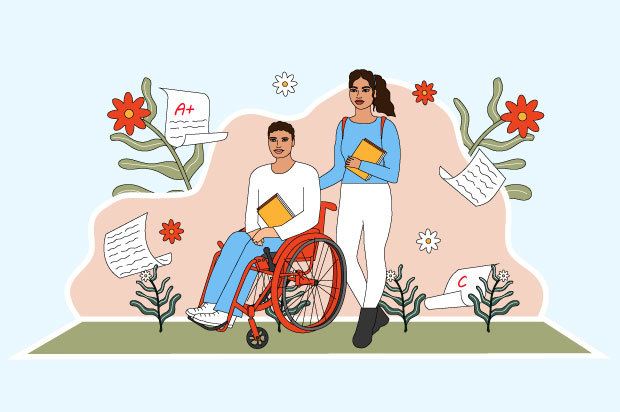What’s it like being a student carer?

My name is Katharine Macy, I’m a 22 year-old postgraduate student studying human evolution. I care for my mother and hope to be able to give carers a voice and increase understanding about what we experience.
My background
I became a carer around the age of 10 – my mother had a breakdown and has never worked since. My first strong memory of caring was when my brother, who is six years younger than me, came home from school to find my mother having a meltdown. I called my grandparents, who always lived close by and helped with our care, and took my brother to the shops while my grandparents helped my mother.
As I grew older, my responsibilities grew with me, due to my grandparents getting older and being in need of care themselves. My grandfather passed away when I was 13. My brother’s and my education was always the priority – both from for my mother and myself. We were both bright and it was how we could get a better life. University was always on the table and it was expected for me to go. For that, I’m incredibly grateful.
Looking at universities as a carer
When I began looking at universities, it felt like the whole world was at my fingertips. I could study anything, anywhere. Learning had always excited me and the idea of getting to learn about a subject in depth. I looked at loads of university websites and eagerly wrote down information about their open days.
Then reality hit – where I lived, very few universities were within a day’s drive and certainly not a day trip with my mother’s condition. This would make university open days expensive – and it did. We tried to penny pinch when we could.
We were lucky to stay with friends in Exeter, York and Oxford. My mother wasn’t well enough to drive on the day of the open days – we had to drive up the day before and drive home the day after. Petrol was still expensive and it was rare friends didn’t suggest dining out.
The interview week with Oxford was also difficult – my mother had to stay the week with me for both of our healths. Despite the stress, I look back at it with happy memories because my mother and I really connected during this time.
Travelling to university
When I’d finally chosen the university for me, I realised we’d not even started the journey. Moving to university, we had to, again, drive up the day before. My university luckily let me move in a day early. Further luck had come when a family member had given me a lot of kitchen items for my 18th birthday. Without this, I would have not been able to afford most of the kitchen equipment I needed.
When my mother drove back on her own, she really struggled. Ever since, my grandmother has had to come with us to ensure my mother isn’t on her own.
What was university like?
Universities are often reasonably diverse and you get to meet people who’ve lived very different lives to you. As a young, autistic carer on benefits – this was very true for me. I was lucky to be in a flat with pretty down to earth people. Even then, it was a culture shock to me. It was also very obvious I was different, for so many reasons. My friends would often get deliveries from home, in comparison, I’d get a few pasta sauces to add to my suitcase when I went back after a weekend home.
Mentioning my caring responsibilities often got confused looks or invasive questions. However, I did at least know how to cook pasta and that a pizza didn’t automatically cut itself as it cooked. Finance stresses were the theme of my childhood, so seeing my peers complain about financial issues while holding a bottle of £50 vodka or planning a night out and eating out became frustrating.
Many people just didn’t quite get it. However, often if I took the time to educate them, I also got to learn about other things people have been through.
Going to university is an invaluable experience both for the academic side and all the other aspects. As a carer, it’s an even bigger challenge – but it’s worth it.
Finding support as a young carer or young adult carer
Visit our young carers hub page for support and information.
Find support from other carers by joining The Mix’s young carer group chats.
Read The Mix’s article to find tips on managing your money as a young carer.
Read The Mix’s guide to caring for someone with a mental health condition.
Get specialist help and support for young carers and young adult carers from the Carers Trust.
Next Steps
- Carers Trust is a major charity for, with and about carers. They work to improve support, services and recognition for anyone living with the challenges of unpaid caring.
- Carers UK equips carers with practical help and advice. Meet others in the same position and get the support you need by joining Carers UK's online forum.
- If you're under 25 and would like free confidential telephone counselling from The Mix to help you figure things out complete this form and we'll call you to arrange your first session.
- Student Minds is the UK's student mental health charity. Search their website for information, research, and to see how you could get involved.
- Mind offers advice and support to people with mental health problems. Their helpline runs nine to six from Monday to Friday. 0300 123 3393
- Chat about this subject on our Discussion Boards.
By Katherine Macy
Updated on 31-Jul-2020
No featured article














